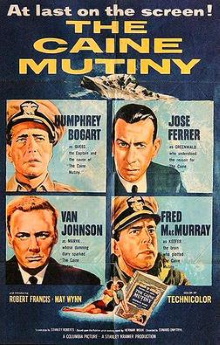
This seems to be a fairly notable film and was commercially successful at the time of its release. I don’t think it is all that good of a film and that’s because of the numerous compromises that it has to make in order to be allowed to exist at all. It’s fascinating in how it has to twist and moderate its narrative to navigate the sensibilities of the US military and probably the general public and would have been a far better film if it had not been required to hold back so much and take matters more seriously.
Ensign Keith is a newly minted naval officer who is assigned to the aging minesweeper USS Caine. He dislikes the first commanding officer who he thinks is lax about discipline and is initially glad that the replacement Lieutenant Commander Qeeng insists on strict enforcement of navy rules. But later he and the other officers realize that Qeeng’s obsession with petty rules causes him to make all kinds of elementary mistakes when he then tries to cover up. The ship’s communications officer who is also a budding writer suggests that Qeeng is paranoid and unfit for command. The first officer Lieutenant Maryk is at first dismissive but starts keeping a log of Qeeng’s quirks. Things come to a head during a typhoon when Qeeng’s orders appear to put the ship in danger and Maryk feels obliged to seize command to save the ship. Keith backs him up and so both are put on trial for mutiny after the ship returns to port.
The premise and themes of this film are ripe with potential and it is pretty amazing that this dates back to the 1950s. Yet there are also plenty of signs showing how touchy this was as a subject. It opens with a notice saying that no US Navy ship has ever mutinied and ends with a dedication to the navy. Though Qeeng is clearly mentally unwell, the film goes to great lengths to show that he is not morally culpable and that he should be seen as a hero as his condition stems from the trauma of combat duty. Indeed it is the fault of the other officers for being insufficiently sympathetic and accommodative to his condition. This film was obviously made with the cooperation of the US Navy as it uses real ships and thus takes care to show realistic details about navy procedures as well as how a proper ship should be run. I understand that his was adapted from a novel and that it is similarly deferential. The result is a film that I feel whose presentation is completely at odds with what really makes it interesting: the complete psychological breakdown of a military officer.
This tonal disjunction is present throughout the entire film. The atmosphere is consistently light with bright and cheery colors. Keith’s personal story of his romance with a singer is a major subplot yet it has no connection whatsoever with the main plot, making it a waste of screen time and a useless distraction even if part of it is beautifully shot at the Yosemite National Park. When the crew sings mocking songs and make up nicknames for Qeeng, it feels like the film is playing it up humor when it should be dark and mean. When the officers visit an aircraft carrier to complain to an admiral, they’re treated to an impromptu parade of sailors on the deck. It’s ridiculous and totally inappropriate. Even when it tries to show Qeeng being agitated and paranoid, the film holds back too much. Giving him the habit of playing with metallic stress hands in his palm when nervous is such a weak tic. There’s so much more that could have been done in the hands of a director who actually specializes in psychological films. It would be full of dark shadows, explosions of rage and crippling fear. Instead we have a film that holds back so much that even when the communications officer betrays the other officers, they are remarkably relaxed about it.
That’s why I don’t think this is actually a good film even if it has the seed of one. The angle that they take that someone like Qeeng should be treated with respect due to his prior service would not hold up today. The best thing that can be done for him would have been to remove him from active duty and give him the best treatment possible. But of course the stigma of being crazy at the time made this an unacceptable humiliation. It is commendable I suppose that the US Navy allowed this to be made back then but it’s not a good enough reason to make this worth watching.